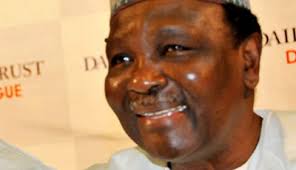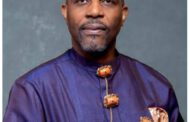BY MIKE IKHARIALE
No one can in good conscience deny the good works that Amnesty International is doing in its avowed mission to promote human rights across the globe. Much of the world owes the organisation immense debts of gratitude for the wonderful job it has done over the years in lifting humanity out of the grip of oppression and vicious human rights violations perpetrated by most governments.
It was established in 1961 through the singular effort of Peter Benenson, a lawyer, who launched an “Appeal for Amnesty ‘61” through an article entitled “The Forgotten Prisoners” published in The Observer newspaper and reprinted in many other news media across the world concerning two Portuguese students who were detained for raising their wine glasses in a toast to freedom. As a result, individuals across Europe and America were so touched about human rights abuses that by July of the same year, the first international gathering took place where the participants agreed to establish “a permanent international movement in defence of freedom of opinion and religion”. That noble objective was later to be expanded by its Statutes to include the promotion of all the rights set out in the United Nations Universal Declaration of Human Rights; fair and prompt trials for all political prisoners; the abolition of torture, other forms of cruel treatment and the death penalty; ‘disappearances’ and extrajudicial killings and more.
It is therefore to be understood that our observations about AI here are not in any way oblivious of its noble history but to only goad it back to its original goal and methods of holding governments accountable for human rights abuses without any political or ideological colouration. In recent times Amnesty has occasionally fallen into avoidable disputes with some governments in ways that tended to blight the otherwise brilliant credentials it arduously built over the years.
It is discernable that Amnesty is a little more excited and audacious, perhaps judgmental, when reporting about poor and weak countries while it manages to stick to the neutral and persuasive language which it is noted for when reporting about rich and powerful countries. Such institutional deference or differentials unwittingly provide guilty nations underserved excuses to then ignore those reports.
I think it is counterproductive to the noble objective of a universal human rights regime when reports are made to look dubious. In this connection, let’s quickly look at the language used in its recent reports on two countries, namely, the US and Nigeria both accused of gross human rights violations:
Nigeria:
“Torture and other ill-treatment by Nigeria’s police and military is pervasive: routine and common throughout the country, in particular in the north. Hundreds of women, men and children in police and military custody across the country are being subjected to a range of physical and psychological torture or other ill-treatment. A large number have already died in detention. The Nigerian government is failing to prevent torture, and to bring suspected perpetrators to justice. Security forces enjoy a climate of impunity. A criminal justice system riddled with corruption and abuse of power means vital safeguards against torture are routinely flouted by Nigeria’s police and military. In line with their obligations under international human rights law, the Nigerian authorities must take all necessary steps to ensure that no detainee is subject to torture or other cruel, inhuman or degrading treatment by members of the security forces.”
United States:
“US Army Private Chelsea Manning was sentenced to 35 years in prison on 21 August 2013, after leaking classified US government material to the website Wikileaks. Some of the documents pointed to potential human rights violations and breaches of humanitarian law by US troops abroad, as well as by Afghan and Iraqi forces operating alongside the US army, and the CIA. Chelsea says she was trying to spark a meaningful debate on the costs of war and raise awareness of US military conduct in Iraq and Afghanistan. But she wasn’t allowed as part of her defence to say that she was acting in the public interest. What’s more, further unnecessary charges were brought against her, including ‘aiding the enemy’. Such charges appeared to be an attempt to put off future whistleblowers seeking to expose government wrongdoing. While awaiting trial, Chelsea was detained for three years, and spent 11 months in conditions described by a UN torture expert as ‘cruel and inhumane’. These included being confined for 23 hours a day to a small cell with no window to the outside.”
It is difficult to tell that these two reports with such divergence in tone and language actually emanated from the same Amnesty. While it was quite civil and decorous in reporting the abuses in the US, it opted to deploy very harsh and derogatory language with respect to its categorisation of the Nigerian regime. This variation in language is a serious mistake for a body acting in an ombudsman capacity. The proper approach is for it to remain clinically detached in all cases. It does not make for justice lambasting third world violators in the strongest possible terms while deploying diplomatese when it comes to the so-called super powers.
Another area where I think Amnesty didn’t level with Nigeria is when it seemed to give too much reliance to the testimonies of obviously aggrieved persons without doing much to corroborate their stories with the concerned bodies or with independent observers. Instead, it would appear as if it relied on popular sentiments and lingering perception. Of course, no one who has lived in Nigeria would fail to notice the ubiquitous abuses of human rights in the form of torture, police brutality and even judicial corruption. But, it is still very important that there should be justice in the accusation. In other words, the abuses alleged ought to be objectively reported as much as possible so that even the authorities concerned would not have much to deny.
Going through the current report on Nigeria, it is obvious that AI downplayed the fact that the country is at war with Boko Haram, a deadly sect whose propensity for human rights violation and heinous crimes against humanity is notorious. Enthusiastically listing a litany of abuses allegedly committed by Nigerian troops while ignoring those committed by the sect is not helpful to human rights advocacy in the long run. The world would have been better educated about the true human rights situation in the country if adequate efforts were put into balancing those horrible findings and the blame allocation amongst the parties as contained in the “research.”
I cannot remember what AI reported about the horrible human rights violations in Abu Ghraib and Guantanamo during the Bush war on terror. It certainly would not have starkly denigrated the US as it did to Nigeria. The title of the report, “’Welcome to hell fire’: Torture and other ill-treatment in Nigeria” is somehow suggestive of a one-sided insight of a multi-dimensional problem. No good purpose is served by such a tendentious label in a report that claims to have looked at all sides to rights violations.
This, I repeat, is not a defence for Nigeria whose human rights records have never been good but an honest invitation to AI to be circumspect and, as much as possible, avoid language that would present it as biased because such would be a direct disservice to the human rights community in its delicate task of educating and convincing governments all over the world to be law-abiding. The human rights movement must not adopt the partisan polemics of national governments and/or opposition groups. It must remain objective and unemotional.













